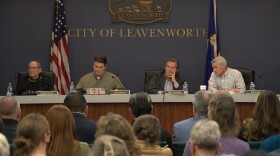The moment that figured to clarify the Kansas race for governor instead left it muddled.
Sure, state Sen. Laura Kelly ended up running away with the Democratic primary on Tuesday. And independent candidate Greg Orman had been waiting in the wings for months.
But the still oh-so-close Republican race between incumbent Gov. Jeff Colyer and Secretary of State Kris Kobach tangled the race in the unknown.
Voters cast more than 300,000 ballots in the GOP primary. The unofficial total left Kobach ahead by 191 votes with an untold number of provisional and mail-in ballots yet to be added.
The two reliably conservative Republicans vowed Wednesday to put their energy behind whoever moves on to the general election. Kobach said he won’t let his campaign stall while waiting for the fuzzy primary to clarify itself.
But a protracted tallying of votes — and the possibility of the man in second place pushing for a recount — delays the usual consolidation of campaign firepower.
Fundraising is likely to falter when donors don’t know if they’re backing a potential winner or an already doomed loser. Talent won’t settle into a single campaign as quickly. Time spent picking apart the opposition could get eaten up by challenges to the primary vote count.
Kelly dodged that limbo. Instead, she could tell reporters how either Republican will represent a continuation of the Sam Brownback years. By the time he left the governor’s office early this year, his unpopularity had Democrats upbeat about their chances of winning the race.
“I’m pumped and I’m ready to get busy working on the general election and winning in November,” Kelly said at a Democratic event in Topeka Wednesday. “We (will) get across that victory line. ...I‘m confident.”
Yet her campaign faces particular dilemmas. Should its strategy, for instance, gear up for Kobach’s hard-line immigration stance and his talk of how politics in Topeka need some sledgehammering? Or does she position herself as the changemaker in opposition to the more laconic Colyer and his constant references to how “the sun is shining in Kansas?”
A poll by Remington Research Group taken a few weeks before the primary showed her prospects against the polarizing Kobach — the candidate endorsed by President Donald Trump on the eve of the Primary — better than if she takes on Colyer.
Kobach insisted he won’t let his campaign sit idle waiting for the final, deciding votes to trickle in.
“Unequivocally, we will be a unified party as we move forward. And if I do hand that baton to Jeff, I will hand that baton with as much momentum as we can,” he said. “But we have to start running right now, because our opponents have already started running.”
A few hours later, Colyer stood in front of reporters and struck a similar, Team Red tone. Republicans, he said, head toward November ready to fend off both Kelly and Orman by appealing to the state’s conservatives.
“It’s important that a Republican governor get elected in November,” the governor said. “I look forward to everybody being unified.”
Orman’s campaign issued a statement Tuesday after the primaries. Rather than address the newly confused dynamics of an already unpredictable three-way race, it attacked party politics. Kelly and the ultimate Republican nominee, Orman said in the release, “will put party and the special interests that control them ahead of the Kansas people and this state for purely partisan gain.”
Amid all this is the ongoing vote counting. Mail-in ballots postmarked Tuesday or before and that arrive by Friday can be included. In addition, the secretary of state's office said as many as 10,000 provisional ballots were cast. Local officials across the state won’t start to certify, or reject, those until Monday.
State law does not have a provision for automatic recounts. But a candidate can request one. The state pays for the cost of a recount in general elections races where the difference in votes between candidates is 0.5 percent or less. But in primaries, the campaign that demands a recount covers the cost.
A losing candidate would also have to gauge the political expense of extending a primary battle that could potentially cost his party the November election.
Colyer, at least, sent out a fundraising email Wednesday afternoon anchored on the possibilty of legal issues surrounding the vote count.
He told reporters Wednesday that he still believed the final tally could turn his way.
“Those votes that are outstanding clearly can change the ... the outcome,” Colyer said.
But what about a recount?
“We’re not there yet,” Colyer said. “We need to get ready for the first count.”
Kobach’s secretary of state’s office oversees elections and will eventually certify the statewide result. He said Wednesday that he didn’t need to recuse himself from the process because county officials certify their results.
Chris Biggs, a former secretary of state, said Kobach has the choice of whether to step aside from the vote count. But he saw merit in finding an “independent referee” to maintain public confidence in the outcome.
“I would want to ... see if there was a way to remove myself from the process,” Biggs said. “I would certainly want to make sure there was public trust in the process.”
(This story has been corrected to reflect who would pay for the cost of a recount.)
Scott Canon is digital editor of the Kansas News Service, a collaboration of KCUR, Kansas Public Radio, KMUW and High Plains Public Radio covering health, education and politics. You can reach him on Twitter @ScottCanon.
Madeline Fox is a reporter for the Kansas News Service. You can reach her on Twitter @maddycfox.
Stephen Koranda is Statehouse reporter for Kansas Public Radio, a partner in the Kansas News Service. Follow him on Twitter @kprkoranda.
Kansas News Service stories and photos may be republished at no cost with proper attribution and a link back to the original post.
Copyright 2018 KCUR 89.3








